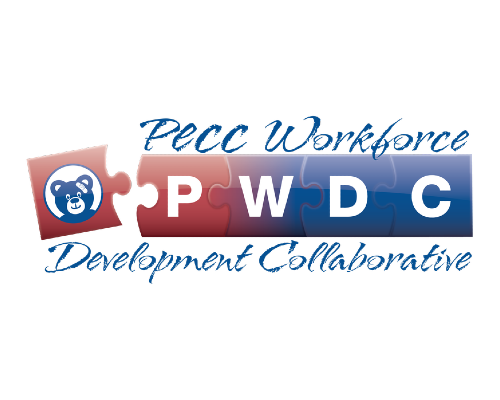PWDC - PECC Workforce Development Collaborative

Developing the Pediatric Emergency Care Coordinator Role
.Introduction to the Collaborative
The EMSC Innovation and Improvement Center hosted a quality improvement (QI) collaborative for Pediatric Emergency Care Coordinators that was aimed at helping PECCs become highly-effective in their role. This collaborative consisted of informational sessions followed by breakout sessions with guest speakers to bring real-world context to the information as well as in-depth question and answer periods for participants. https://emscimprovement.center/collaboratives/pwdc/
For more information on QI collaboratives and how they are distinct from training courses please see here https://emscimprovement.center/news/qi-collaboratives-empowering-practical-solutions/
Below is an abbreviated guide to the informational sessions and worksheets from the collaborative. These sessions provide an overview of different components of what a Pediatric Emergency Care Coordinator can do in either an ED or pre-hospital setting. You can watch just the specific sessions you are most interested in or watch the sessions in order. The full sessions, links, recordings and guides can be found here https://emscimprovement.center/collaboratives/pwdc/sessions/
Instructions on how to best watch these sessions:
Sessions 3-6 introduce basic QI principles/terminology to discuss how to approach the different focus areas specified below. If you are unfamiliar with QI principles, it may be helpful to watch session 2 before watching these other sessions but it is not required. These sessions start with an introduction about the collaborative itself so we have added a note on the timestamp when that session’s core content starts after this introduction. You will also notice that the videos reference “environmental scan” during these sessions. The environmental scan is located in the worksheet guides available in each session and serve as a way to assess your organization for that session’s focus (e.g. Session 2 worksheet guide includes a section to help to assess the state of patient safety in your ED and opportunities for improvement).

This session provides an overview of what a Pediatric Emergency Care Coordinator is and the different aspects of pediatric emergency care they can work on.
https://www.youtube.com/watch?v=IaXZjoR6KV8&feature=youtu.be

This session provides an overview of the core concepts of quality improvement following the Institute for Healthcare Improvement’s Model for Improvement.
(Main content starts at 10:33): https://www.youtube.com/watch?v=pI6UexcZpBk

This session is focused on reviewing pediatric patient safety by reviewing why patient safety and family-centered care are important and an overview of some ways to approach improving pediatric patient safety and family-centered care as well as how to begin assessing pediatric patient safety and family-centered care in your institution.
(Core content starts at 5:24): https://www.youtube.com/watch?v=plYOZ68boWQ
If you are interested on focusing on improving pediatric patient safety and family-centered care, this is the worksheet guide referenced at the end of the session that you can use to start thinking through pediatric patient safety and family-centered care in your organization.
https://media.emscimprovement.center/documents/2_-_Patient_Safety__Family-Centered_Care.pdf

This session is focused on reviewing equipment and supplies needed to improve pediatric readiness and strategies to obtain supplies including how to collaborate with other organizations to lessen burden/cost, maintaining up to date supplies, and orientation of staff to supplies.
(Core content of session starts at 6:57): https://www.youtube.com/watch?v=ptmYZ1xcrmU
If you are interested on focusing on improving pediatric equipment, supplies and medications, this is the worksheet guide referenced at the end of the session that you can use to start thinking how to optimize equipment, supplies and medications for pediatric patients in your organization.
https://media.emscimprovement.center/documents/3_-_Equipment_Supplies__Medications_2021.11.01.pdf

This session is focused on how to create and implement effective policies and procedures that meet the needs of children, including strategies/recommendations to target issues such as communication, education, funding, and leveraging technology.
(Core content of session starts at 8:48): https://www.youtube.com/watch?v=H8aC_fHepyU
If you are interested on focusing on improving policies and procedures, this is the worksheet guide referenced at the end of the session that you can use to start assessing how to create and implement new policies and procedures within your organization.
https://media.emscimprovement.center/documents/4_-_Policies__Procedures_2021.11.24.pdf

This session is focused on how to develop a pediatric competency program to ensure pediatric skill maintenance for your to staff to managing critically ill children from an organizational level including how to change the culture at your institution, funding as well as free resources, and policy and procedure considerations.
(the main part of session starts at 8:52): https://www.youtube.com/watch?v=cVU8FGzFxzc
If you are interested on focusing on starting to institute a pediatric skills competency program at your institution, this is the worksheet guide referenced at the end of the session to start assessing your current competency program and opportunities for improvement.
https://media.emscimprovement.center/documents/5_-_Care_Team_Competencies_2022.01.04.pdf

This session is focused on how to help advocate for pediatric readiness and your value in your role as a PECC with your institution.
(the main part of session starts at 12:46): https://www.youtube.com/watch?v=N9PALMueqiI
This worksheet guide will help you assess and strategize how to advocate for your role as PECC in your institution.